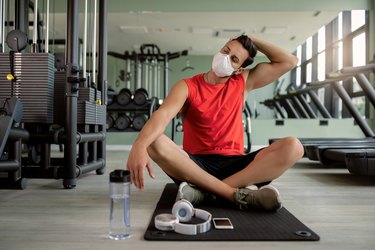
There's a certain satisfaction most of us feel when we wake up with sore shoulders or arms after a tough upper-body workout. But no one loves waking up with a stiff neck.
If you're experiencing a stiff neck after a training session, there's a chance you may need to adjust your exercise form or workout altogether. Read on to learn what your body's telling you when you experience neck pain after weight lifting.
Video of the Day
Video of the Day
Related Reading
1. You Shrug Your Shoulders Too Much
Performing each and every exercise with good form is crucial, especially if you want your neck to stay pain-free, per Harvard Health Publishing.
But if you're shrugging your shoulders too high toward your ears, you can put undue stress on your neck, leaving you sore and stiff after your workout, New York-based physical therapist at Bespoke Treatments, Sam Becourtney, DPT, CSCS, tells LIVESTRONG.com.
Fix It
Bring your shoulder blades down and back so that your arms can do the proper movement without straining your neck or upper trapezius muscle.
"Think about the shoulder blade as the flag post and the shoulder as a flag — you need to anchor down the flag post for the flag to fly properly," Becourtney says.
2. Your Head Is Diving Forward
Ever notice your chin jut forward as you press a weight over your head? It could be a reason you're experiencing neck pain post-workout.
When you lift weights, you want to keep your neck and head in line with the rest of your body, Becourtney says. But if you're overhead pressing weights that are too heavy for you, for instance, your head may dive forward to compensate for shoulder or core weakness, leaving your neck a little strained.
Fix It
If it's available to you, try exercising in front of a mirror and focus on keeping your arms in line with your ears, Becourtney says.
"This typically ensures proper neck, head and shoulder positioning for optimal strengthening, while minimizing neck strain," he says. Also, try tucking your chin by retracting your skull and maintain this position.
3. You Have Improper Eye Placement
Your gaze plays a big (and underrated) role in post-workout neck pain, according to Becourtney. Think about it: When you look down, your head tilts down and when you look up, your head tilts up.
"I find the gaze to be most problematic when performing hinging patterns (like deadlifts), as people commonly look in the mirror to watch their form," he says. "This causes hyperextension and strain of the neck."
Or, if you're working out alongside a mirror, you may find yourself twisting and turning your head to check your exercise form, which can cause similar problems.
Fix It
Focus on maintaining a neutral position with your neck, Becourtney says. Instead of twisting your neck to look in the mirror, arrange your workout bench to face the mirror without causing misalignment in your neck. And if you're performing hip-hinge exercises, try to completely avoid looking in the mirror.
4. You're Not Balancing Your Exercises
Programming your workouts strategically is crucial if you want to keep your body moving pain-free. But if your routine overdoes one movement without balancing the opposite, you may experience some muscular imbalance, which can cause muscle strain.
Often there's no one exercise that's the cause of your neck pain (unless you have an injury), according to the American Council on Exercise. More likely, your stiffness is the result of workout problems building over time. That's why it's so important that you have a well-developed training plan.
Fix It
When you plan your workouts for a given week, ensure there's a good balance between pushing and pulling movements as well as vertical and horizontal variations, Becourtney says.
"If any one muscle group feels fatigued, try to choose an opposite muscle group to train later in the workout or the following day to avoid irritation related to overworking any one muscle group in or around the neck."
For instance, if your training regimen includes push-ups, a chest-dominant move, one day, you'll want to incorporate rows, a back-dominant exercise, the next to ensure your muscles stay balanced, he says.
Was this article helpful?
150 Characters Max
0/150
Thank you for sharing!
Thank you for your feedback!